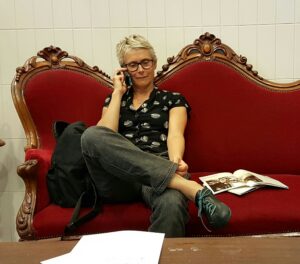Katie Mitchell: Die Frau ohne Erwartungen – a critical look at the enigmatic absurdities that Katie Mitchell incorporates into her opera productions… Katie Mitchell’s latest production, Die Frau ohne Schatten, is yet another disappointment for the Dutch National Opera this opera season. Artistic feminazism that once again ends up deceiving the opera audience.
Katie Mitchell presents:
Die Frau ohne Schatten
Die Frau ohne Schatten. Double celebration.
There’s a party goin’ on right here
A dedication to last throughout the years
So bring your good times and your laughter too
We gonna celebrate and party with you
Come on now
Party! We say it so easily. At our house, it’s no problem. Coffee and cake, followed by beer and whisky. But ‘party’ doesn’t mean ‘party everywhere’, of course. Do you think the celebrations surrounding Liverpool’s championship were also celebrated in Manchester? And what about the poor soul born on Leap Day? Once every four years, he or she gets his or her favourite meal (fish and chips). Mutatis mutandis, the same applies to dystopian masses: which of two simultaneous mourning ceremonies should we attend? How do I keep everyone happy? The Dutch royal family, especially the sexy young princesses who immediately make us forget all thoughts of 70 virgins with questionable hygiene: should they visit a provincial town to celebrate King Willem Alexander’s birthday or should they attend the Pope’s funeral? Neither is a walk in the park, we would cautiously say. The fact that the royal family chose the provincial town shows their willingness to sacrifice themselves for the Dutch people, from villa to slum.
Of course you recognise it immediately: Die Frau ohne Schatten!
And then there is the complicated situation of the so-called ‘double celebration’. Two celebrations at the same time; if they take place at the same location, there is no problem. But if you have to report on them as an opera magazine, you have no choice but to make a decision. And Opera Gazet had to make that decision. We were able to attend two heart-warming celebrations in one and the same place, but which one should we focus on in our reporting? Celebration no. 1, Die Frau ohne Schatten by the Dutch National Opera, or celebration no. 2, Katie Mitchell’s last time as an opera director? The OG editorial meeting on this issue lasted two minutes: the unanimous decision was to focus on Katie Mitchell’s farewell, a highlight in opera history. Unfortunately, Strauss must now make way for an even greater genius: Katie Mitchell, who, in her own words, is ‘completely done with the far too misogynistic art form of opera’. Our opera-loving hearts are filled with fear: WHAT NOW?! But first, we must express our respect for the performance of Strauss, because how often do we hear Strauss (or Mozart or Wagner) at the DNO? Rarely, right? (sarcasm intended) With a few exceptions, the cast reached a rarely heard low level. The screeching of Aušrinė Stundytė (Baraks Weib) and Michaela Schuster (Die Amme) was particularly unbearable. Fortunately, the orchestra, the conductor and the choir were still there: excellent. Direction: an artistic failure that surpassed Zholdak’s Fidelio in terms of insane nonsense. And again, deception: once more, pure label fraud! The filth on stage had nothing to do with Strauss’s opera. The audience was once again deceived and did not get what they paid for, but instead a hefty dose of idiocy, madness, nonsense, bullshit, gibberish, kwatsch and silliness.
But now to the other celebration. Katie Mitchell is quitting opera directing. No more operas will be judged according to strict feminist standards. The misogyny of Mozart, Donizetti and Handel will have to be tackled by other misguided souls, and Mitchell herself now has plenty of time to work on the long-awaited maintenance of her sense of insignificance and the healing of her narrow Weltanschauung.
What a glorious day for opera! The sun is shining brighter, the birds are singing with extra vibrato, and even Strauss seems lighter on the stomach – for hallelujah, a feminist opera director has finally decided to lay down her “baton”, or rather her merciless whip! No more half-naked Don Giovanni doing penance in an IKEA office, no more Tosca discussing her murder with Scarpia under neon lights as if it were therapy. The arias can breathe again without pathologically woke decor!

Sind die neuen feministischen Maßstäbe schon geliefert worden?
(Have the new feminist standards already been delivered? )
Mitchell put it this way: ‘If you hire me, you get a feminist deconstruction. That’s my trademark. I wanted to set the story in a theatre in the 1970s, during the second wave of feminism. One of the singers refuses to continue singing in protest against misogyny in opera. It was a really fun concept.’
As a tribute, we would like to recall some of the highlights of Mitchell’s career.
Who remembers the 2016 production of Lucia di Lammermoor, with its delightful masturbation and rape scenes? And the madness scene became a ‘graphic’ childbirth. Exactly as Donizetti had imagined it.
In 2015, Alcina became a clinical dissection, a scientific experiment in a laboratory setting. Again, exactly as Handel had imagined it.
Written on Skin, one of Mitchell’s more accessible productions, was given a detached and chilling psychological approach that stemmed from a neurodivergent way of thinking.
And then there was the 2016 Pelléas et Mélisande, Debussy’s magical symbolism had disappeared. It was replaced by banal domestic realism. Lots of bathrooms, little mystery.
Explicit physical violence and a distaste for anything poetic were always Mitchell’s trademarks; opera, composer, librettist… all minor details. Finally, let us give this representative of hypocritical skull measurement the last word with the aforementioned quote. Lest we forget:
‘If you hire me, you get a feminist deconstruction. That’s my trademark. I wanted the action to take place in a theatre in the 1970s, during the second wave of feminism. One of the singers refuses to continue singing in protest against the misogyny in opera.’
A farewell, not like a ripe apple but like a rotten one falling from the tree.

